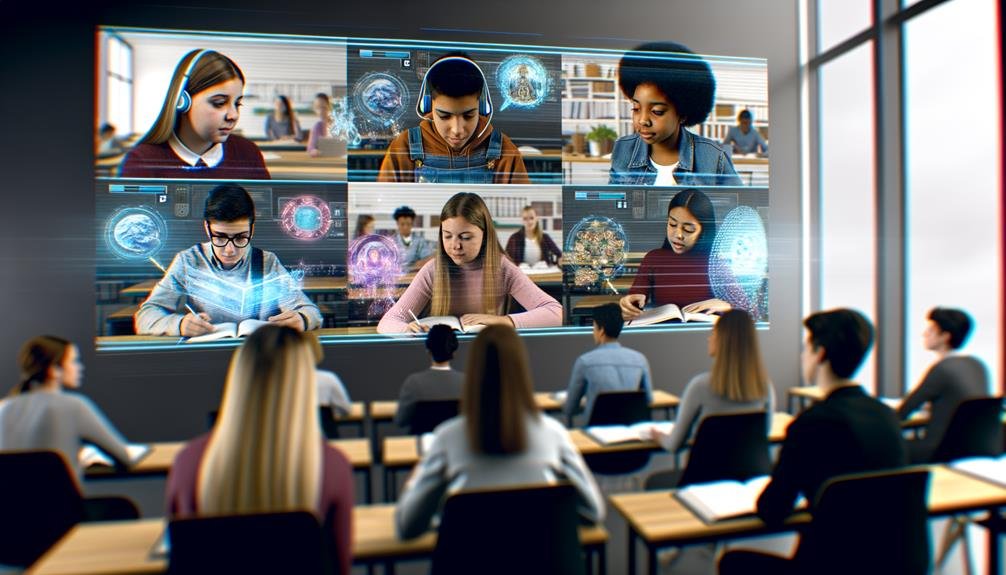Revolutionizing Education: Cognitive Learning Goes Virtual
In today's rapidly evolving educational landscape, the fusion of cognitive learning theory with virtual platforms is redefining traditional teaching methods.
The convergence of cognitive principles with digital technology presents a paradigm shift in how knowledge is acquired and retained.
As educators and technologists continue to explore the vast potential of this innovative approach, the implications for student engagement, knowledge retention, and overall learning outcomes are substantial.
This transformation not only challenges conventional educational norms but also opens up a realm of possibilities for personalized, immersive learning experiences that cater to individual needs and preferences.
Key Takeaways
- Virtual classrooms merge cognitive learning with technology for immersive experiences.
- AI personalization tailors learning, offering dynamic and adaptive environments.
- Virtual labs provide hands-on experiences, enhancing practical learning.
- Gamification boosts engagement, motivation, and knowledge retention in virtual education.
Virtual Classrooms Enhance Cognitive Learning
Virtual classrooms revolutionize cognitive learning by seamlessly integrating traditional educational principles with cutting-edge technology, fostering an immersive and interactive learning experience. Through virtual collaboration, students engage in real-time discussions, group projects, and peer feedback, enhancing their understanding and retention of knowledge.
These virtual environments offer immersive experiences through 3D simulations, virtual field trips, and interactive activities, making learning more engaging and memorable. The blend of technology and education in virtual classrooms creates a dynamic space where students can explore concepts through hands-on experimentation and visualizations, catering to diverse learning styles.
Interactive Simulations for Engaging Learning
Utilizing interactive simulations transforms the educational experience by providing hands-on, immersive learning opportunities that captivate students' attention and enhance their understanding of complex concepts. These simulations offer:
- Real-world Scenarios: Simulations immerse students in practical situations, allowing them to apply theoretical knowledge.
- Immediate Feedback: Students receive instant feedback on their actions, aiding in better comprehension and retention.
- Adaptive Learning Paths: Simulations adjust based on student responses, personalizing the learning experience.
- Collaborative Learning: Virtual engagement fosters collaboration among students, promoting teamwork and diverse perspectives.
Interactive simulations not only create immersive experiences but also enhance student engagement, making learning more dynamic and effective.
Personalized Learning Paths With AI Integration
Enhancing educational pathways through personalized learning integrated with AI technology is revolutionizing the landscape of modern learning methodologies.
AI-powered customization allows for tailored learning experiences, catering to individual needs and preferences. By analyzing vast amounts of data, AI can provide personalized recommendations for each learner, suggesting suitable learning materials, activities, and pacing. This level of customization ensures that students receive content that aligns with their unique learning styles, maximizing comprehension and retention.
Through AI integration, educational platforms can adapt in real-time to address students' strengths and weaknesses, creating a dynamic and adaptive learning environment. The fusion of personalized learning paths with AI technology is reshaping the way individuals engage with educational content, fostering more efficient and effective learning outcomes.
Virtual Labs for Hands-On Experience
Incorporating immersive digital environments into educational settings enriches practical learning experiences through cutting-edge simulation technologies. Virtual labs offer hands-on experience through remote experimentation and virtual science labs. This approach provides immersive simulations, offering experiential learning opportunities without physical constraints.
The benefits of virtual labs include:
- Access Anytime, Anywhere: Students can engage in experiments remotely, enhancing flexibility and accessibility.
- Cost-Effective Solutions: Virtual labs eliminate the need for physical equipment, reducing costs for educational institutions.
- Safe Learning Environment: Students can conduct experiments in a controlled, risk-free setting.
- Enhanced Learning Outcomes: The interactive nature of virtual labs promotes deeper understanding and retention of concepts.
Gamification in Virtual Learning Environments
Leveraging game mechanics and interactive elements in virtual learning environments revolutionizes student engagement and motivation. Gamification benefits in virtual learning include increased interactivity, immediate feedback, and personalized learning experiences tailored to individual progress.
By incorporating elements like leaderboards, badges, and virtual rewards, educators can create a more immersive and enjoyable learning environment. These virtual rewards serve as incentives for students to actively participate, complete tasks, and strive for continuous improvement.
Moreover, gamification enhances retention rates and knowledge absorption by making learning fun and challenging. Overall, integrating gamification into virtual learning environments not only boosts student motivation but also fosters a sense of achievement and progress, ultimately leading to more effective and engaging educational experiences.
Real-Time Feedback for Continuous Improvement
Utilizing real-time feedback mechanisms is imperative for fostering continuous improvement in virtual cognitive learning environments. Leveraging instant feedback and personalized progress tracking enhances the learning experience by providing immediate insights into performance. Continuous evaluation ensures that learners stay on track and receive tailored interventions when needed, promoting adaptive learning strategies.
Here's a breakdown of why real-time feedback is essential for virtual cognitive learning:
- Instant Feedback: Immediate insights into performance allow for quick adjustments and improvements.
- Personalized Progress Tracking: Tailored feedback enables learners to monitor their development and focus on areas needing improvement.
- Continuous Evaluation: Ongoing assessment ensures that learners are meeting goals and adapting to challenges.
- Adaptive Learning: Feedback drives personalized learning paths, optimizing the learning process for each individual.
Collaborative Projects in Virtual Settings
The evolution of virtual cognitive learning environments necessitates a seamless integration of collaborative projects to enhance engagement and foster interactive learning experiences. Virtual group projects offer students the opportunity to work together regardless of physical location, promoting teamwork and communication skills essential for success in the digital age.
Implementing virtual teamwork strategies, such as utilizing online collaboration tools and establishing clear communication channels, can enhance project outcomes and facilitate a sense of community among learners. These collaborative endeavors not only mirror real-world professional scenarios but also encourage creativity, critical thinking, and problem-solving skills.
Adaptive Assessments for Mastery Learning
In the realm of modern educational practices, adaptive assessments play a pivotal role in facilitating mastery learning outcomes through personalized evaluation methodologies. These assessments leverage cutting-edge technology to provide tailored feedback and guidance, enhancing the learning experience for students.
Key elements of adaptive assessments for mastery learning include:
- Real-time Mastery Tracking: Constant monitoring of student progress allows for immediate intervention and support.
- Personalized Learning Pathways: Individualized learning plans based on assessment results cater to each student's unique needs.
- Data-Driven Insights: Learning analytics provide valuable information on student performance, helping educators make informed decisions.
- Continuous Improvement: Adaptive assessments enable ongoing refinement of teaching strategies, leading to better learning outcomes.
Conclusion
In this era of technological advancement, the integration of cognitive learning theory into virtual platforms has revolutionized education.
The future holds endless possibilities for innovative pedagogy and transformative learning experiences.
As we embrace the digital age, the irony lies in the fact that while technology connects us virtually, it is cognitive learning that truly connects us intellectually.
Let us continue to push the boundaries of education and unlock the full potential of virtual learning in shaping the minds of tomorrow.







